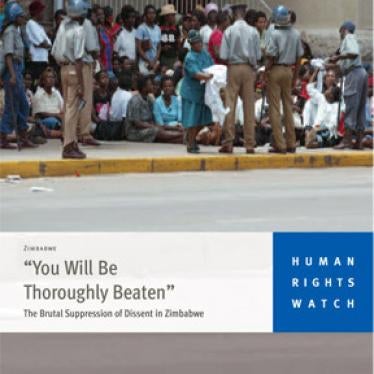When President Thabo Mbeki and other leaders of the Southern African Development Community (SADC) met in Tanzania last week to address the crisis in Zimbabwe, they responded by announcing another round of "quiet" diplomacy.
Not a word was said in public about how Zimbabwean security forces arbitrarily arrest, detain and brutally beat opposition leaders and ordinary citizens around the country.
In an effort to end the crisis, SADC mandated Mbeki to lead its efforts to mediate a dialogue between Zimbabwe's ruling party and the opposition. But Zimbabwe’s worsening crisis will not be resolved until SADC leaders start talking openly about the massive human rights violations committed by the Mugabe government, and demand an immediate end to them.
According to SADC leaders, directly confronting and criticising Robert Mugabe about his abusive policies is counter-productive. But seven years of this approach have not resulted in an improvement in the country's economic or human rights situations. Instead, the suffering of Zimbabweans has only deepened, driving about three million of them to South Africa.
The Zimbabwean government crushes dissent with violence and brutality, and denies its citizens their fundamental freedoms of expression, assembly and association. SADC's continuing silence and its failure to call on Mugabe to account only encourages further abuses.
Perhaps SADC leaders should explain their approach to Chipo (not her real name), a 46-year-old woman I met last week in Glenview, one of the Harare suburbs worst affected by the violence. Chipo knows all too well the brutal methods favoured by Zimbabwean authorities.
In the early hours of March 12 police officers suddenly forced their way into her home and beat Chipo and her family with truncheons and rifle butts. Chipo was beaten unconscious and sustained serious head injuries and a fractured wrist.
When I interviewed her, Chipo started crying as she recounted how the police officer told her she deserved to be roughed up because, "you are the people who support the opposition."
Chipo and her family have never been involved in politics. But in many neighbourhoods like Glenview, police go from house to house, randomly beating people and accusing them of supporting the opposition.
And Chipo is not alone. Throughout Zimbabwe ordinary people live in constant fear of random violence at the hands of the security forces. During my recent two-week visit to the country, dozens of Zimbabweans told me they had faced similar abuses from the police, members of the Central Intelligence Organisation, youth militia and Zanu-PF members and supporters. Anyone remotely connected to the opposition or other forms of civic activism--and even those who are not--runs the risk of arrest, abduction and brutal beating.
One opposition activist told me about how police arrested her and her relatives and savagely beat them. "I tried to tell them not to beat my mother because she is old and not an activist, but they wouldn't stop," she said.
"They said she was my mother and, therefore, deserved to be beaten. We were detained for three days and then released without charge."
Zimbabweans are desperate for an end to the brutal human rights abuses they are suffering at the hands of the security forces, and the restrictions on their internationally recognised rights to political freedom. Mbeki should concentrate his efforts on bringing a robust human rights agenda to the mediation table.
This means calling on the Zimbabwean authorities to rebuild the institutions that ensure respect for human rights, democracy and the rule of law; including an independent judiciary. It means calling for a professional security force that protects its citizens and respects human rights, rather than one that beats people who dare to oppose the government.
It is about calling for an end to the disdain for human rights that is now so entrenched in Zimbabwe's security forces, and bringing the perpetrators to account. It is about repealing repressive legislation and opening up the democratic space for free and fair elections. It means upholding the tenets of regional peace and security, and the respect for human rights that SADC leaders have vowed to promote.
In the past, "quiet" efforts by African leaders to mediate the crisis in Zimbabwe have failed. This time Mbeki must succeed, or his talk of an African renaissance and a new era of respect for democracy and human rights in African governance sounds like empty rhetoric. Chipo and other Zimbabweans like her have been consistently let down not only by their government, but by their regional leadership.
If the SADC is serious about its solidarity with the people of Zimbabwe, it needs to stand up for justice and human rights in Zimbabwe.
Tiseke Kasambala is a researcher at Human Rights Watch.







